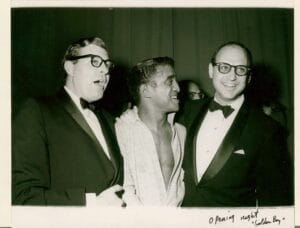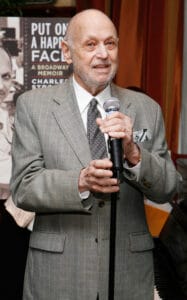A native of New York City, Strouse grew up singing songs with his family around his mother’s piano. He studied music as a career, thinking he would do something in the classical genre, but one of his teachers (Nadia Boulanger, 1887–1979, a French music teacher, conductor and composer who taught many of the leading composers and musicians of the 20th century), suggested he focus on “light music” as “to make someone forget illness and suffering is also a calling.”
He took it to heart, and called upon his memories of his New York childhood singing around the piano when he wrote what perhaps became his most-listened-to song: “Those Were the Days” — the theme to the hit TV show, All in the Family (205 episodes from 1971 to 1979). But even that was after a long series of Broadway hits he composed for, starting with 1960’s Bye, Bye Birdie (including its hit, “Put on a Happy Face”), which brought him his first Tony Award (for Best Musical). He quickly moved on to work with Mel Brooks for 1962’s All American …but it bombed, closing after 80 performances.

There were many more shows, and several films, but he’s best known for writing the music for Annie (1977), including its big hits, “Tomorrow” and “It’s the Hard Knock Life”. Strouse worked on and off (mostly on) with a collaborator, Lee Adams, starting in 1952, with Strouse mostly writing the music and Adams mostly writing the lyrics. “We’ve always been very closely collaborative,” Strouse said in a 2008 interview. “I’m that way, kind of, with everyone, but I’m more married to Lee, in a sense. That is, we gave and took from one another and argued like married people. I still have that closeness to him. One of the reasons we don’t work much today is that he leads a healthier life than I do. He likes sitting around in the country and reading. I don’t — I’m lost unless I’m composing.”

Strouse almost turned down Annie. “I hated it because I had done a show called It’s a Bird … It’s a Plane … It’s Superman, and it closed in four months,” he said. “Hal Prince, its producer and director, always said to me that if you ever write something for children, you better make sure it’s marketed as an adult show that a parent can bring a child to. If it’s a children’s show, it won’t be as successful. And sure enough, he hit on something.” Annie ran for 2,377 performances before it closed for a rest. Danielle Brisebois, who played Molly in the original production, said at the time, she “based my opinion on people from how they made me feel and how they treated me. When I first met Charles Strouse, I was 100 percent enamored with him. His warm smile and his soulful eyes … He was always encouraging, thoughtful and kind. I had no idea I was in the presence of a legend!”
As for shows that didn’t do well, “Everybody has flops,” he said. “When I teach, the students say, ‘How can you work three or four years on a show … and it flops? How do you recover from that?’ The only answer is, you’ve done your best, it didn’t work, what’s next?” It helps that sometimes, one of his songs from a bum show takes off. With All American, “Once Upon a Time” was covered by Perry Como, Eddie Fisher, Al Martino, Tony Bennett, Frank Sinatra, and Bobby Darin, among many others. There were also two more Tony Awards (for Applause and Annie), Two Emmy Awards (for his TV adaptations of Annie and Bye Bye Birdie), and two Grammy Awards for Annie. Plus, timed to come out for his 80th birthday, Put on a Happy Face: A Broadway Memoir * was published in 2008. Charles Louis Strouse died in New York City on May 15. He was 96, and it was hardly the Hard Knock Life.
